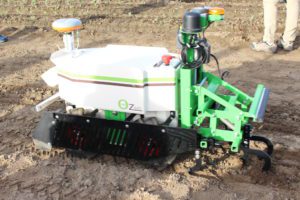Nov 1, 2022Small organic growers give input on ag tech
Specialty crop growers and their tools are usually inseparable. But is that the case for small organic vegetable growers and compact agricultural robots?
A pair of Michigan State University (MSU) associates sought an answer to that question by interviewing growers primarily from Michigan (along with one from Ohio and another from Maryland) to determine their perceptions and attitudes about agricultural robots. They conducted 14 interviews during the winter and spring with small organic vegetable growers, with some cut flower growers also included.


Doug Bessette, an assistant professor in MSU’s Department of Community Sustainability, reported on the questionnaire findings at the Mechanical Weed Control Field Day in mid-September in Benton Harbor, Michigan. Bessette partnered with Dan Brainard, MSU professor in the Department of Agriculture, who works closely with Michigan vegetable growers.
The upshot of the sessions were that growers reported a lack of knowledge and experience with agbots. Most of the growers were only mildly to moderately interested in their emergence as a tool for the agricultural industry. Many of the respondents exhibited serious concerns about what the widespread use of agricultural robots would mean for farmers.
There are concerns regarding how agbots might affect their daily tasks and their identity, organic farms’ customers, and the long-term health and viability of food production more generally.
However, concerns about the availability and quality of labor also made the idea of using robotics and mechanizing aspects of the vegetable farm attractive.
“Most of the growers didn’t have any particular experience with this robot or robots in general,” Bessette told the field day audience. “These are representative results, so I’m not saying this is how all growers feel. We’re going to do a survey eventually, but this was just an interview with 14 organic growers. Most of them were mildly to moderately interested in the technology.
“Many of them had concerns about what greater mechanization of farming might look like and what impact that might be to their identity as farmers,” he said.
The interview subjects were small operators with an average of 17 acres, but most had 2-10 acres of vegetables, either certified by the U.S. Department of Agriculture or using organic farming practices, even if they weren’t certified.
“There were two intentions with this survey,” Bessette said. “First, to show them an agricultural robot and see what their perceptions were to kind of adopting that kind of technology, and then change that robot to see what aspects of that robot they were most excited about.”
A large portion of the growers were asked about the Naio Oz, a compact robot for small farms.
“Most of them didn’t know about it so they didn’t have any preconceived perceptions of that robot,” he said. “That’s why we thought it was OK to use that type of robot as a prototype.”
The surveyors described the machine as a small and simple agbot that operates autonomously to plant perfectly straight rows within one or two centimeters of specifications. It can then track those rows to manage weeds between and near the crop row. It can operate autonomously for six to 10 hours before needing a recharge. The Naio Oz has a maximum speed of 1.1 mph, with an estimated three to four minutes to plant or weed 300 feet of row crops..
“Our first intention was to find out how growers responded to that. For the most part we found there was some willingness,”Bessette said. “They weren’t beating down the doors to go buy one but they were interested in it. We asked what they would be willing to pay for this. The answers were somewhat abstract and we couldn’t draw conclusions from that.”
He said the majority of growers compared the agbot cost to how much labor they could replace with it, “so it depended on what they were paying for that.”
“We changed individual aspects of the robot,” he said. “We said the original robot didn’t do within-row weeding, and then said what if we change it so that it did. We found a lot of growers were interested in that but they wanted closer precision so we said what if it could do in-row weeding of six inches or more.”
Bessette said “a lot of them” wanted greater precision of three to four inches.


“We asked, ‘what if we make it go faster?’ Most farmers weren’t interested for more speed. They were asked if they’d pay a little bit more but for the most part they thought one mile an hour was fast enough for these small growers.”
A scenario of the agbot returning autonomously to fixed points on the farm for transporting tools, produce or equipment, “really excited” the respondents.
“They kind of imagined robots doing things on the farm without having to pay attention,” Bessette said.
Growers were asked about potential data collection, such as the agbot gathering data about soil moisture, pests or plant health. Their excitement about receiving the information came with concerns about data security.
“Where’s the data going to, the quality of that data and what’s the usability of that data?” he said. “Is it data that they’re actually going to use? Many of them were already collecting data and wondered if they would have to check the robot’s data with their own data afterward. There was some concern about that.
“We asked about continuous operation, such as what if it could operate continuously for 12 hours and return to a charging station autonomously to charge?” Bessette said. “So, it would be like set it and forget it. It’s doing its thing on the farm and (the grower) is not necessarily having to monitor it. People were pretty excited about that and would be willing to pay a little bit more for a robot that could do that.”
One question focused on the agbot potentially spanning multiple rows with high clearance. A majority of growers were interested in that. Some of them said they would rather have better precision within row weeding over a larger span of rows.
“We asked, ‘what if it had an onboard solar panel so it literally could be forgotten about?’ It’s out there in the field and as long as it’s sunny it has power and it can do its own thing,” he said. “Some of the growers were interested but most of them said solar access probably would be unnecessary.”
Respondents were worried about how their customers perceive these technologies.
“One grower imagined the situation where they’re customer is driving past and sees a robot out on the farm. They didn’t know how that would affect their customer base. Would it make their customers concerned or would they be excited about that?
The organic growers had concerns about viability of health and long-term food production, Bessette said: Who is passing this knowledge on to their children or future farmers?
“There was concern that if everything is mechanized, who retains that knowledge and passes it onto the next generation of farmers?”
Despite the reservations, the questioners observed there also was abundant concern regarding the availability and cost of agricultural workers.
“A lot of these growers are in areas where it’s very difficult to get good labor or to have people come back to the farm every season,” Bessette said. “Some of them are really struggling to find that labor, so they were really excited about the opportunity to have robots on the farm that might reduce their labor costs or reduce the headaches of trying to find this labor.”
— Gary Pullano, senior VGN correspondent














